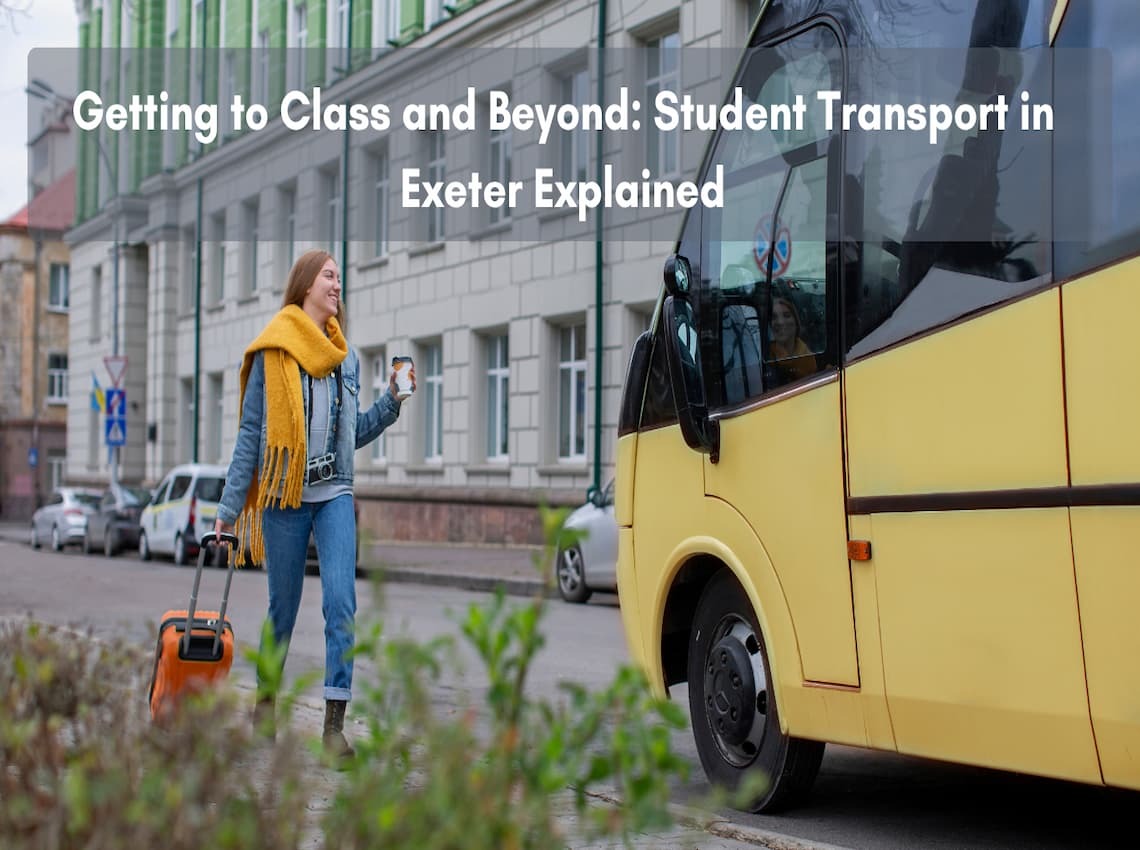

Getting to Class and Beyond: Student Transport in Exeter Explained
Moving to Exeter as a student means stepping into a city that’s easy to explore and full of opportunities. Thanks to Exeter’s efficient and student-friendly transport system, getting from your student accommodation in Exeter to campus, cafes, or nightlife spots is smooth and stress-free. Whether you’re commuting daily or heading out for some weekend fun, you’ll find the city’s transport options perfectly suited to student life.
This ultimate guide will walk you through everything you need to know about getting around Exeter, from affordable bus and train routes to savvy money-saving tips. Plus, learn the best ways to connect with popular student accommodation areas so you can make the most of your time and budget in this vibrant city.
TL;DR: Student Transport in Exeter
- Exeter’s transport is student-friendly and budget-conscious.
- Stagecoach buses cost just £1.80 for a single ride.
- Route 4 bus links the University of Exeter campus and city centre every 12 minutes.
- Annual bus passes offer big savings for regular travellers.
- Two train stations provide easy access beyond the city.
- Walking is popular for short trips thanks to Exeter’s compact layout.
- Student discounts make getting around even more affordable.
Discover more about the student experience and daily life in Exeter in our blog on How is student life in Exeter.
Understanding Exeter's Transport Network
Exeter's transport system revolves around several key providers. Each serves different purposes for student life.
Main Transport Providers
Provider | Service Type | Coverage Area | Student Discounts |
Stagecoach | Local buses | City-wide and Devon | Yes - various passes |
Great Western Railway | Trains | National network | 16-25 Railcard |
CrossCountry Trains | Long-distance | UK-wide | Student discounts |
Apple Taxis | Taxi service | Local area | University approved |
Stagecoach dominates local transport. They operate most bus routes within Exeter. Their services connect student areas to the university and city centre.
Great Western Railway handles most train services. They connect Exeter to London and other major cities. Journey times to London take around 2 hours and 20 minutes.
Bus Services: Your Main Transport Option
Buses provide the backbone of student transport in Exeter. They're affordable and frequent. Most students rely on buses for longer journeys across the city.
Key Bus Routes for Students
Route 4: The Student Lifeline, this route connects the University campus to the city centre. It runs every 12 minutes during peak hours. The service operates from 5:00 AM to midnight Monday through Friday.
Key stops include:
- University of Exeter (Streatham Campus)
- Exeter St Davids Station
- City Center (Paris Street)
- Honiton Road Park and Ride
- Cranbrook
Route 4A: Airport Connection Links Exeter Airport to the city center. Runs every 20 minutes. Single tickets cost £3.00. Perfect for international students arriving by air.
Night Bus Service (UNI) Operates Wednesday, Friday, and Saturday nights. Runs between midnight and 4:00 AM. Connects student accommodation to the city center every 30 minutes.
Bus Ticket Prices and Options
Ticket Type | Price | Best For |
Single | £1.80 | Occasional travel |
Day Return | £3.20 | Return same day |
Weekly Pass | £18.00 | Regular commuters |
Monthly Pass | £65.00 | Daily users |
Annual Megarider | £630.00 | Frequent travelers |
Single journey fares across Devon are capped at £3.00 until December 2024. This government initiative helps students manage transport costs.
Student Discount Options
- Stagecoach Termrider: University students can access subsidised Termrider passes. These provide unlimited travel within designated Devon areas. The pass covers the entire academic term , including weekends and holidays.
- Flexible Tickets: Students not travelling daily can choose flexible options. Five-day and ten-day tickets offer discounted rates. These work well for part-time students or those with irregular schedules.
- University Staff Discounts: Staff receive 30% off annual Megarider passes. Students working part-time at the university may access similar benefits.
Train Services: Connecting to the Wider UK
Exeter offers excellent rail connections. The two main stations serve different purposes for students.
Exeter St Davids Station
This is the main railway station. It handles long-distance services to London, Birmingham, and Scotland. The station sits about a 15 -15-minute walk from the city centre.
Direct services include:
- London Paddington (2h 20m)
- Birmingham New Street (3h 30m)
- Leeds (5h 15m)
- Edinburgh (8h 45m)
Exeter Central Station
Located closer to the city centre. Handles local and regional services. Just 5 5-minute walk to the High Street. Perfect for day trips within Devon and Cornwall.
Popular destinations:
- Exmouth (30 minutes, £4.80 return)
- Plymouth (1h 15m, £12.40 return)
- Paignton (45 minutes, £8.60 return)
- Barnstaple (1h 30m, £15.20 return)
Student Rail Discounts
- 16-25 Railcard costs £30 annually. Provides one-third off most rail fares. Essential for regular train travellers. It can save hundreds of pounds per year.
- 26-30 Railcard for older students. Same benefits as a 16-25 Railcard. Costs £30 per year.
- Digital Railcards are Available through smartphone apps. Same discounts as physical cards. More convenient for spontaneous travel.
Getting to Student Accommodation
Exeter's student accommodation is spread across the city. Transport connections vary by location. Here's how to reach popular areas.
University Campus Accommodation
- Streatham Campus: Route 4 bus provides direct access. Runs every 12 minutes to the city centre. Walking to lectures takes 5-10 minutes maximum.
- St Luke's Campus: Several bus routes serve this area. Route 57 connects to Heavitree Road. The walking distance to the city centre is about 25 minutes.
Top Student Housing Properties:
City Centre Accommodation
Prime location for students preferring urban living. Walking distance to most amenities. Bus connections to the university campus every 12 minutes via Route 4.
Popular areas include:
- Cathedral Yard vicinity
- Gandy Street area
- Queen Street surroundings
Top Student Housing Proeprties:
Want to know what makes Exeter's student accommodation stand out? Explore our full breakdown on why choose Exeter student accommodation to find out what to expect and how to choose the right place for your lifestyle.
Residential Areas Popular with Students
- Pennsylvania Area: Well-connected by multiple bus routes. Routes 5, 6, and 54 serve this area. The journey to university takes 15-20 minutes.
- St Thomas Area: Growing student population. Route 1 and 1A provide regular services. Slightly affordable accommodation with good transport links.
- Heavitree: Traditional student area. Routes 57 and T2 connect to the city center. Mix of purpose-built and shared accommodation.
Looking for student accommodation?
Our support team can assist you for free Book with BestStudentHalls today!
Cost Comparison: Finding Value
Transport costs significantly impact student budgets. Smart choices can save hundreds annually.
Annual Cost Comparison
Transport Method | Annual Cost | Best For |
Walking/Cycling | £0-150 | Close to campus |
Occasional Bus Use | £200-400 | Mixed transport |
Regular Bus Pass | £630 | Daily commuters |
Train Season Ticket | £800-1200 | Long-distance |
Car (including parking) | £2000+ | Rural students |
Plan your budget with ease with the help of our handy cost of living calculator to see how your choices impact your finances in real time.
Money-Saving Strategies
- Combine Walking and Public Transport: Walk for short distances. Use buses for longer journeys or in bad weather. This hybrid approach saves money while maintaining convenience.
- Buy Annual Passes Early: Stagecoach offers payment plans. Spread costs across 12 months. Avoid large upfront payments while securing discounts.
- Group Travel: Travel with friends for long-distance journeys. Split taxi costs for late-night returns. Group booking discounts are available on some services.
- Student Accommodation Location: Choose accommodation near campus or with good transport links. Factor transport costs into accommodation decisions. Sometimes, higher rent with better location saves money overall.
For a detailed breakdown of how transport fits into your overall expenses, check out our cost of living in Exeter guide.
Practical Tips for New Students
Starting university in Exeter requires transport planning. These tips help navigate the system efficiently.
First Week Essentials
- Download the Stagecoach Bus app: Real-time tracking prevents missed buses. Journey planning features help navigate new routes.
- Get a student ID card quickly: Many discounts require valid student identification. Some services offer additional student-only benefits.
- Explore walking routes: Exeter is compact and walkable. Many students prefer walking for short distances. Good exercise and cost-free transport.
Managing Peak Times
- Morning Rush (7:30-9:00 AM): Buses fill quickly during peak hours. Allow extra time for your journey. Consider slightly earlier or later travel times.
- Evening Peak (4:30-6:30 PM): Similar congestion during afternoon rush. Plan accordingly for consistent arrival times.
- Weekend Nights: Night bus services operate on Wednesday, Friday, and Saturday. The last regular buses run around midnight. Plan return journeys carefully.
International Student Considerations
- Airport Connections: Route 4A connects Exeter Airport to the city centre. Direct service every 20 minutes. Costs £3.00 for a single journey.
- London Connections: Direct trains to London Paddington. Book advance tickets for better prices. Heathrow and Gatwick are accessible via London connections.
- Luggage-Friendly Options: Trains accommodate large luggage better than buses. Consider this for major journeys with multiple bags.
Cycling and Walking in Exeter
Many students choose active transport. Exeter supports cycling and walking through various initiatives.
Cycling Infrastructure
- Bike Lanes: Dedicated cycling lanes connect major areas. The university provides secure bike storage. The popular route follows the Exe Trail to Exmouth seaside.
- Bike Rental Options: Several providers offer student-friendly rental schemes. Daily, weekly, and monthly options are available. Good for testing cycling before purchasing.
- Safety Considerations: Helmet use is recommended but not mandatory. Bike lights are required during dark hours. Registration with university security is advisable.
Walking Routes
Campus to City Centre: Well-lit pedestrian routes are available. The journey takes 20-25 minutes. Many students prefer walking for exercise and cost savings.
Popular Walking Areas
- Quayside development
- Cathedral area
- Northernhay Gardens
- Riverside paths
Special Transport Services
Exeter offers specialised transport for specific student needs.
Accessible Transport
- Disabled Access: All new buses feature wheelchair accessibility. Train stations provide step-free access options. University transport includes accessible vehicles.
- Support Services: University transport office assists with accessibility planning. Local councils provide additional support for students with mobility needs.
Emergency Transport
- Late Night Options: Night bus service covers Wednesday, Friday, and Saturday nights. Apple Taxis provide university-approved service. Emergency numbers available through student services.
- Breakdown Support: Student car owners can access university breakdown assistance. Several local garages offer student discounts for repairs.
Technology and Apps
Modern technology simplifies transport planning in Exeter.
Essential Apps
Stagecoach Bus App
- Real-time bus tracking
- Journey planning
- Mobile ticketing
- Service updates
National Rail Enquiries
- Train timetables
- Ticket booking
- Price comparisons
- Delay notifications
Citymapper Exeter
- Multi-modal journey planning
- Walking directions
- Real-time updates
- Accessibility information
Digital Payments
Most services accept contactless payments. Mobile ticketing reduces queuing time. Student accounts link to various payment methods.
Environmental Considerations
Students increasingly prioritise sustainable transport choices.
Carbon Footprint Comparison
Transport Mode | CO2 per km | Environmental Rating |
Walking/Cycling | 0g | Excellent |
Bus (shared) | 45g | Good |
Train | 60g | Good |
Car (single occupancy) | 180g | Poor |
Sustainable Options
- Public Transport Priority: Choose buses and trains over private cars. Reduced environmental impact and cost savings. The university actively promotes sustainable transport.
- Active Transport: Walking and cycling provide zero emissions. Health benefits include improved fitness. Social benefits through community interaction.
Future Transport Developments
Exeter continues investing in transport infrastructure.
Planned Improvements
- Bus Service Enhancements: Frequency improvements on popular routes. Extended operating hours during term time. Additional night services under consideration.
- Cycling Infrastructure: New cycle lanes planned for 2025-2026. Improved storage facilities atthe university. Better connections between accommodation areas.
- Digital Integration: Enhanced mobile app features. Better journey planning across multiple transport modes. Integrated payment systems in development.
Getting Around Exeter Made Simple
Getting around Exeter as a student doesn’t have to be stressful, or expensive. With regular bus routes, walkable streets, and quick train links, the city makes it easy to balance lectures, part-time jobs, weekend trips, and nights out. Whether you’re catching the Route 4 to campus, hopping on a train to London, or just strolling through town, Exeter’s transport network fits every kind of student lifestyle.
Planning ahead is key. Annual bus passes can save you a small fortune, walking keeps you fit and budget-friendly, and living near good transport links can cut daily hassle in half. International students will also appreciate easy airport access and clear connections to major UK cities.
Your daily routine will be shaped by where you live, so it’s worth choosing accommodation that doesn’t leave you chasing buses or rushing trains. Smart travel starts with smart housing.
Looking for student accommodation in Exeter that’s close to campus and well-connected? Discover top-rated options with the best transport links at Best Student Halls, and make getting around one less thing to worry about.

Frequently Asked Questions
Does Exeter have good public transport?
Exeter may be compact, but it’s well-connected. The city has a reliable bus network, including Park & Ride services that make commuting into the centre a breeze. Trains are also a solid option, with multiple local stations and regular services to nearby towns and cities. That said, many students find they can walk or cycle almost everywhere, Exeter’s size and layout make it easy to get around without relying heavily on transport.
Is Exeter a good city for students?
Exeter blends academic excellence with a laid-back, student-friendly vibe. The University of Exeter is a Russell Group institution with a strong reputation, and the city itself is safe, scenic, and packed with green spaces, cafés, and cultural events. It’s big enough to keep things interesting, but small enough to feel like home. Want to know what makes it tick? Our pros and cons of living in Exeter blog gives you the full picture.
What is the crime rate in Exeter City Centre?
Exeter is considered one of the safer major cities in the South West. While the city centre does see typical urban crime, mostly anti-social behaviour and petty theft, overall crime rates are lower than the national average. Students generally feel safe, especially when sticking to well-lit areas and taking standard precautions. For a closer look at safety from a student’s perspective, check out our blog on whether Exeter is safe for international students.
What is the average salary for a graduate in Exeter?
Graduates from the University of Exeter typically earn between £24,000 and £27,000 within six months of finishing their degree. Of course, this varies by industry and role, but it’s a solid starting point, especially when paired with Exeter’s relatively low cost of living. If you’re looking to boost your income while studying, our guide to part-time jobs in Exeter for students is packed with tips and opportunities.

Bhakti
Bhakti is a talented content writer, editor and social media enthusiast. Her in-depth blogs and city guides reflect her curious mind and love for writing. Her creativity and research-intensive approach allow her to create informative articles with a fresh perspective. She often includes hot tips that make for an engaging and impactful read. Bhakti is a fan of tennis, fashion and literature with a special interest in digital culture.

Getting Around York as a Student: Tips, Discounts, and Routes You Must Know

Best Clubs in York: A Complete Student Nightlife Guide

Student Life in York — Complete Guide for International Students (2025)


 Free Cancellation
Free Cancellation














Comments
Leave a comment